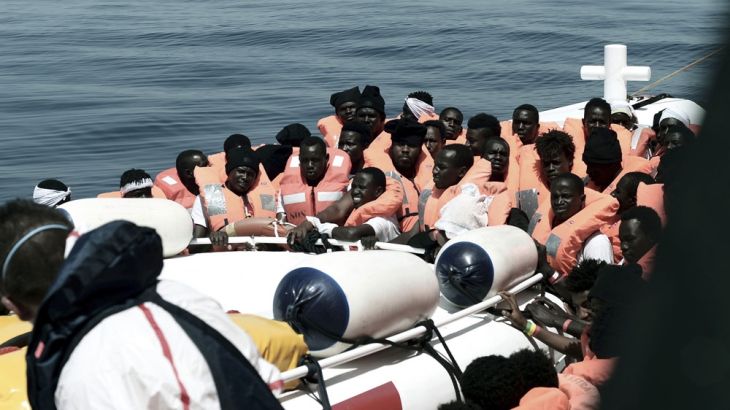‘Europe’s moral compass lost’: Uncertainty over Aquarius refugees
European policies are criminalising vulnerable people, rights groups say, as hundreds are left stranded for days at sea.

Human rights groups have denounced Italy and Malta’s refusal to allow a refugee rescue ship to dock at their ports, amid growing uncertainty for the hundreds of people on board, including 123 unaccompanied minors.
In a statement on Tuesday, Amnesty International accused the Italian and Maltese governments of “trampling the principle of rescue at sea and undermining the entire search and rescue system”.
Keep reading
list of 4 itemsIraq criminalises same-sex relationships with maximum 15 years in prison
The Abu Ghraib abuse scandal 20 years on: What redress for victims?
April 27, 1994: What has changed in South Africa 30 years after apartheid?
“If allowed to go unchallenged, [this] will discourage and compromise the lifesaving work of NGO’s leaving thousands of migrants and refugees adrift in the Mediterranean,” Elisa De Pieri, Amnesty’s Italy researcher, said.
The Aquarius, which is jointly operated by SOS Mediterranee and Doctors Beyond Borders (known by its French acronym MSF), had rescued 629 people from the Mediterranean Sea and remained unable to dock since Saturday.
The people on board, including 11 children and seven pregnant women, are from several African countries and had set off from the coast of Libya to reach Europe.
Aloys Vimard, a project coordinator for MSF who is on board the Aquarius, said on Monday that “although people are calm, we can see that they are getting anxious”.
“The boat is overcrowded and we are above capacity. We have very vulnerable people on board and most of them are exhausted.”
Four extra days at sea
The Aquarius was denied the right to dock in Italy and Malta, the closest countries, before Spain’s new Prime Minister Pedro Sanchez said he would give the ship “safe harbour” at the eastern port of Valencia.
But MSF officials said that disembarking at the closest port was preferable to a journey of an extra four days, taking into account deteriorating weather conditions coupled with tensions and maximum capacity on board the Aquarius.
“The better option would be to disembark the rescued people in the nearest port after which they can be transferred to Spain or other safe countries for further care and legal processing,” the organisation said.
The statement came as Italy’s coastguard announced it would send two ships to take on some of the refugees to relieve overcrowding and transport them to Valencia.
MSF also expressed concern over the condition of patients who had to be resuscitated after rescue, saying they could develop “significant pulmonary issues after swallowing sea water.”
“People rescued at sea must be disembarked in nearest safe port.”
While De Pieri welcomed the Spanish government’s offer as a show of solidarity, she also said that the move “highlights the calculated callousness of the Italian and Maltese authorities.”
“This sets a precedent that will inevitably cost lives,” she said.
‘Unacceptable’ behaviour from Italy
The nationalist authorities on the French island of Corsica meanwhile also offered to receive the Aquarius, in a move criticised by the central government in Paris.
“[Corsican leader Gilles Simeoni] is taking a position without having any responsibility which is easy,” Jean-Baptiste Lemoyne, junior Europe and foreign affairs minister told Sud Radio.
“What does international law say? They need to go to the port that is safest and closest. And we can see that Corsica is not the closest or the safest. Given the boat’s location, it is between Italy and Malta,” he added.
Still, French President Emmanuel Macron criticised Italy for its “cynicism and irresponsibility”, saying during a cabinet meeting that under maritime law “in cases of distress, those with the closest coastline have a responsibility to respond.”
“If a boat had France as its closest coast, it could land,” Macron’s spokesman Benjamin Griveaux said.
Griveaux accused the new far-right government in Rome of lacking solidarity.
“You can’t create a precedent that will enable one European country to offload onto other European countries,” he said. “We need to show solidarity, which Italy has not shown.”
On the other end of the spectrum, Hungary praised Italy’s decision to refuse to allow refugees to dock at its ports.
Viktor Orban, the virulently anti-migrant prime minister, praised the Italian government’s decision as a “great moment which may truly bring changes in Europe’s migration policies.”
Speaking at a meeting on Tuesday with his Slovak counterpart Peter Pellegrini, Orban said that it had been “so depressing” to hear for years that Europe’s maritime borders cannot be defended that “one practically lost the will to live.”
‘Moral compass lost’
According to the International Convention for the Safety of Life at Sea, any ship learning of distress at sea must assist, no matter the circumstances.
The convention also states that the country responsible for operations in that area has primary responsibility for taking in the people on the ship.
Vimard, the MSF project coordinator on board the Aquarius, said that he is “extremely concerned” about how difficult it is to perform lifesaving rescue missions at sea.
“It’s very worrying that once again politics are being placed above the safety of vulnerable people,” he said in his statement.
“Anybody in distress at sea should be rescued and treated in a dignified way. European policies are criminalising and stigmatising people seeking protection and rights which are afforded to them under international humanitarian law.”
Karline Kleijer, an emergency coordinator for the MSF, said that a political game is being played over the heads of 629 people.
“This standoff shows how Europe has lost its moral compass in the Mediterranean,” MSF quoted her as saying.